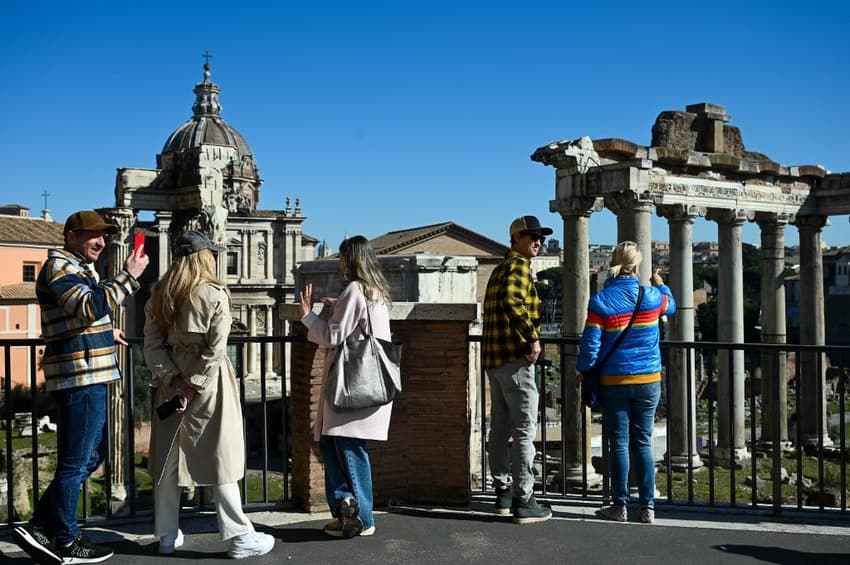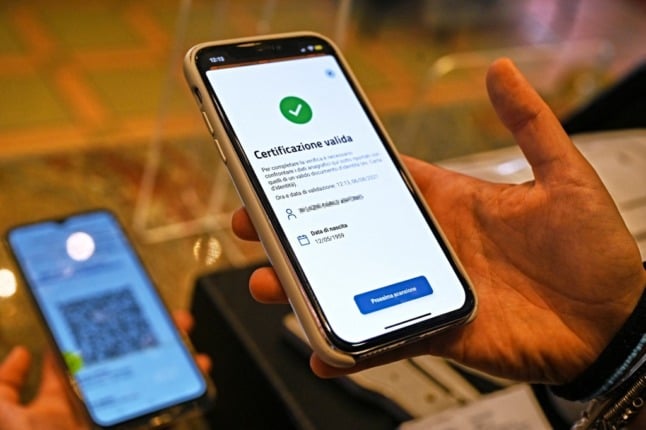TIMELINE: Where and when will Italy relax its Covid rules?

Over two years since Italy’s Covid emergency began, the Italian government has published its long-awaited roadmap back to normality.
On Friday, the Italian government published the text of its long-awaited decreto riapertura, or 'reopening decree', laying out the country’s roadmap towards the end of the current Covid restrictions by early summer.
Though Prime Minister Mario Draghi first announced the plans at a press conference on March 17th, many of the details had been unclear until now.
As expected, measures will be lifted gradually over a number of weeks. The main dates to remember are April 1st and May 1st.
Here’s an overview of what will change and when according to the final text of the decree (see it here, in Italian).
April 1st
Italy’s state of emergency will officially end on March 31st, over two years after it was first introduced.
Some restrictions will be gradually relaxed or removed starting from the following day, Friday, April 1st.
From this date, the green pass or certificato verde will no longer be needed to access hotels, museums, shops and local offices (including bank branches and post offices).
Proof of a negative Covid test result will be enough for entry to indoor bars and restaurants, while you’ll no longer need any form of health pass at all to sit at outdoor tables at bars and restaurants.

Italy's Prime Minister, Mario Draghi takes off his mask to speak about the planned lifting of the country's Covid-19 state of emergency and restrictions at a press conference on March 17th. Photo by Filippo MONTEFORTE / AFP
The capacity of outdoor clubs and stadiums will be restored to 100 percent, and proof of a negative test result will also be accepted in order to access open-air concerts, stadiums, theatre performances or cinema screenings.
For indoor venues, the ‘super’ green pass remains a requirement (proof of vaccination against or recovery from Covid-19, but not via testing).
The relaxation of the rules in April opens up these venues to people who have not been vaccinated against Covid-19 as long as they test negative.
However, passes issued based on the results of PCR tests are only valid for 72 hours (from the time of testing). For rapid tests, the validity period is 48 hours.
The health pass requirements for accessing long-distance, interregional public transport will also be downgraded, with only a basic green pass needed (rather than a ‘super’ green pass as is currently the case).
For local public and regional public transport services (such as city buses and trams), no certificate of any kind will be required from April 1st.
Until May 1st, however, the use of Ffp2 face masks will remain mandatory on all means of public transportation; from trains and ferries to taxis and ski lifts.

Photo by Andreas SOLARO / AFP
Schools will also no longer employ any distance learning or 'DAD' (didattica a distanza) from April 1st. That means full presence in class and the return of school trips and sports days, which have been cancelled for the past couple of years.
The requirement to wear masks, meanwhile, remains in force until the end of the school year - children under 6 years old remain exempt. Surgical masks as well as Ffp2 are accepted.
Quarantines will also be scrapped. Until the end of March, four positive cases in a class triggers DAD for the whole class. From April 1st, if there are positive cases, the class can still attend school with an Ffp2 mask for 10 days.
May 1st
From this date, Italy will finally bid farewell to the much-contested green pass (basic or super) in almost all situations, including in indoor restaurants and on interregional public transport..
There will be one exception: those wishing to visit friends or relatives in hospitals or care homes will be required to show a valid ‘super green pass’. This measure is expected to remain in place until at least December 31st, 2022.
Also from May 1st, Italy will say goodbye to another staple of the ‘Covid era’, namely face masks. Masks will no longer be necessary indoors, nor on public transport.
For schools, external staff and parents are no longer required to have a green pass to enter school premises.
June 15th
This date brings the end of the Covid vaccination mandate for people aged over 50, teachers and those in the emergency services and armed forces
It is worth remembering that, although mandatory vaccination will remain in place throughout April and May, people over 50 will only be required to provide a valid ‘basic’ green pass in order to enter workplaces.
This marks a large departure from previous measures, which effectively prevented all residents without a valid ‘super’ green pass from working.
Yet again though, there will be an exception. Vaccination will remain mandatory for hospital and care home workers up until the end of 2022. Failure to comply will be met with a €100 fine.
From this date, mandatory vaccination also ends for teachers. Until then, the decree text reads, "Vaccination is an essential requirement for carrying out teaching activities in contact with pupils."
What about the travel rules? The incoming plans to ease Italy’s domestic restrictions do not affect the rules for international arrivals, which were last updated at the beginning of March.
Find information about Italy’s Covid-19 rules on the Italian health ministry’s website (available in English).
Comments
See Also
On Friday, the Italian government published the text of its long-awaited decreto riapertura, or 'reopening decree', laying out the country’s roadmap towards the end of the current Covid restrictions by early summer.
Though Prime Minister Mario Draghi first announced the plans at a press conference on March 17th, many of the details had been unclear until now.
As expected, measures will be lifted gradually over a number of weeks. The main dates to remember are April 1st and May 1st.
Here’s an overview of what will change and when according to the final text of the decree (see it here, in Italian).
April 1st
Italy’s state of emergency will officially end on March 31st, over two years after it was first introduced.
Some restrictions will be gradually relaxed or removed starting from the following day, Friday, April 1st.
From this date, the green pass or certificato verde will no longer be needed to access hotels, museums, shops and local offices (including bank branches and post offices).
Proof of a negative Covid test result will be enough for entry to indoor bars and restaurants, while you’ll no longer need any form of health pass at all to sit at outdoor tables at bars and restaurants.

The capacity of outdoor clubs and stadiums will be restored to 100 percent, and proof of a negative test result will also be accepted in order to access open-air concerts, stadiums, theatre performances or cinema screenings.
For indoor venues, the ‘super’ green pass remains a requirement (proof of vaccination against or recovery from Covid-19, but not via testing).
The relaxation of the rules in April opens up these venues to people who have not been vaccinated against Covid-19 as long as they test negative.
However, passes issued based on the results of PCR tests are only valid for 72 hours (from the time of testing). For rapid tests, the validity period is 48 hours.
The health pass requirements for accessing long-distance, interregional public transport will also be downgraded, with only a basic green pass needed (rather than a ‘super’ green pass as is currently the case).
For local public and regional public transport services (such as city buses and trams), no certificate of any kind will be required from April 1st.
Until May 1st, however, the use of Ffp2 face masks will remain mandatory on all means of public transportation; from trains and ferries to taxis and ski lifts.

Schools will also no longer employ any distance learning or 'DAD' (didattica a distanza) from April 1st. That means full presence in class and the return of school trips and sports days, which have been cancelled for the past couple of years.
The requirement to wear masks, meanwhile, remains in force until the end of the school year - children under 6 years old remain exempt. Surgical masks as well as Ffp2 are accepted.
Quarantines will also be scrapped. Until the end of March, four positive cases in a class triggers DAD for the whole class. From April 1st, if there are positive cases, the class can still attend school with an Ffp2 mask for 10 days.
May 1st
From this date, Italy will finally bid farewell to the much-contested green pass (basic or super) in almost all situations, including in indoor restaurants and on interregional public transport..
There will be one exception: those wishing to visit friends or relatives in hospitals or care homes will be required to show a valid ‘super green pass’. This measure is expected to remain in place until at least December 31st, 2022.
Also from May 1st, Italy will say goodbye to another staple of the ‘Covid era’, namely face masks. Masks will no longer be necessary indoors, nor on public transport.
For schools, external staff and parents are no longer required to have a green pass to enter school premises.
June 15th
This date brings the end of the Covid vaccination mandate for people aged over 50, teachers and those in the emergency services and armed forces
It is worth remembering that, although mandatory vaccination will remain in place throughout April and May, people over 50 will only be required to provide a valid ‘basic’ green pass in order to enter workplaces.
This marks a large departure from previous measures, which effectively prevented all residents without a valid ‘super’ green pass from working.
Yet again though, there will be an exception. Vaccination will remain mandatory for hospital and care home workers up until the end of 2022. Failure to comply will be met with a €100 fine.
From this date, mandatory vaccination also ends for teachers. Until then, the decree text reads, "Vaccination is an essential requirement for carrying out teaching activities in contact with pupils."
What about the travel rules? The incoming plans to ease Italy’s domestic restrictions do not affect the rules for international arrivals, which were last updated at the beginning of March.
Find information about Italy’s Covid-19 rules on the Italian health ministry’s website (available in English).
Join the conversation in our comments section below. Share your own views and experience and if you have a question or suggestion for our journalists then email us at [email protected].
Please keep comments civil, constructive and on topic – and make sure to read our terms of use before getting involved.
Please log in here to leave a comment.